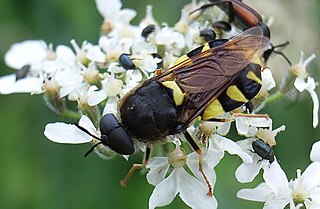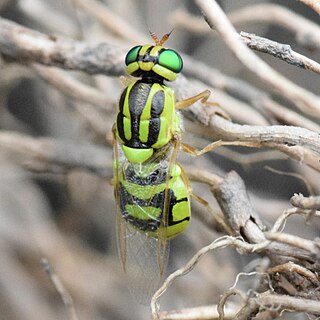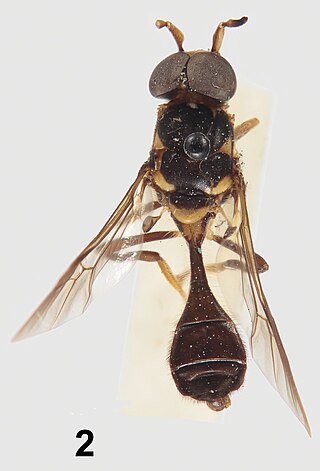
The soldier flies are a family of flies. The family contains over 2,700 species in over 380 extant genera worldwide. Larvae are found in a wide array of locations, mostly in wetlands, damp places in soil, sod, under bark, in animal excrement, and in decaying organic matter. Adults are found near larval habitats. They are diverse in size and shape, though they commonly are partly or wholly metallic green, or somewhat wasplike mimics, marked with black and yellow or green and sometimes metallic. They are often rather inactive flies which typically rest with their wings placed one above the other over the abdomen.

Eugène Séguy was a French entomologist and artist who specialised in Diptera. He held a chair of entomology at the Muséum national d'histoire naturelle in Paris from 1956 to 1960. He is also known for establishing the Diptera section at that museum. This entomologist is often confused with a French artist with a similar name: Émile-Allain Séguy[] (1877–1951). The latter is known for his pochoir artworks representing plants.

Athericidae is a small family of flies known as water snipe flies or ibis flies. They used to be placed in the family Rhagionidae, but were removed by Stuckenberg in 1973. They are now known to be more closely related to Tabanidae. Species of Athericidae are found worldwide.

Stratiomyini is a tribe of flies in the family Stratiomyidae.

Oxycera trilineata, the three-lined soldier, is a Palearctic species of soldier fly. Boldly marked in yellowish-green and black, it is found in a variety of wetlands, including pools, ditches, fens and swampy river margins. It is found in North European Russia up to Leningrad; Central Asia, Siberia. Western Europe, north up to southern Sweden.

Oxycera pygmaea, the pygmy soldier, is a European species of soldier fly.

Oxycera morrisii, the white-barred soldier, is a European species of soldier fly.

Nemotelus notatus, the flecked snout, is a European species of soldier fly.

Nemotelus is a genus of soldier flies in the family Stratiomyidae. Nemotelus is known from the Nearctic, Afrotropical and the Palaearctic regions.

Beris is a genus of flies in the family Stratiomyidae. They are also referred to as the false soldier fly. As described by Latreille in 1802, these are small to medium sized flies with metallic colors.

Stratiomyinae is a subfamily of flies in the family Stratiomyidae.

Pachygastrinae is a subfamily of flies in the family Stratiomyidae.

Sarginae is a subfamily of soldier flies in the family Stratiomyidae.

Parastratiosphecomyia stratiosphecomyioides is a species of fly in the family Stratiomyidae. It is native to Thailand. Its genus name comes from Ancient Greek, meaning "Near soldier wasp-fly", with its specific epithet meaning "wasp fly-like". It is considered to be the animal with the longest valid scientific name; the name Gammaracanthuskytodermogammarus loricatobaicalensis, an amphipod described in 1926 by Benedykt Dybowski, was longer, but was suppressed and is no longer valid, and the bacterium Myxococcus llanfairpwllgwyngyllgogerychwyrndrobwllllantysiliogogogochensis has the longest name of any organism, but it is not an animal. P. stratiosphecomyioides, sometimes referred to as the Southeast Asian soldier fly, was described in 1923 by British entomologist Enrico Brunetti. This insect is usually between 10.3 and 10.4 mm.

Allognosta is a genus of soldier flies in the family Stratiomyidae.

Stratiomys laticeps is a species of soldier fly in the family Stratiomyidae.

Actina viridis is a species of soldier fly in the family Stratiomyidae.
Asyncritula is a genus of flies in the family Stratiomyidae.
Chrysochromioides is a genus of flies in the family Stratiomyidae.
Afrodontomyia is a genus of flies in the family Stratiomyidae.















